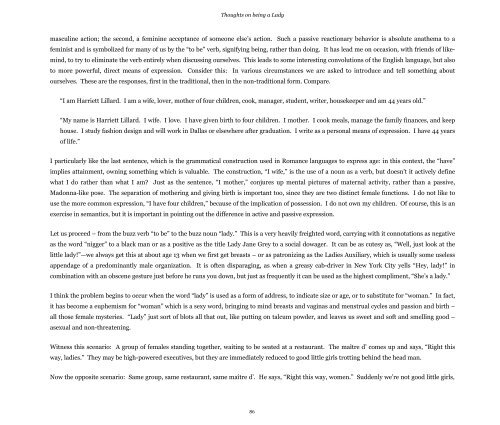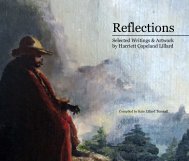Reflections - cover2
Selected Writings & Artwork by Harriett Copeland Lillard
Selected Writings & Artwork by Harriett Copeland Lillard
Create successful ePaper yourself
Turn your PDF publications into a flip-book with our unique Google optimized e-Paper software.
Thoughts on being a Lady<br />
masculine action; the second, a feminine acceptance of someone else’s action. Such a passive reactionary behavior is absolute anathema to a<br />
feminist and is symbolized for many of us by the “to be” verb, signifying being, rather than doing. It has lead me on occasion, with friends of likemind,<br />
to try to eliminate the verb entirely when discussing ourselves. This leads to some interesting convolutions of the English language, but also<br />
to more powerful, direct means of expression. Consider this: In various circumstances we are asked to introduce and tell something about<br />
ourselves. These are the responses, first in the traditional, then in the non-traditional form. Compare.<br />
“I am Harriett Lillard. I am a wife, lover, mother of four children, cook, manager, student, writer, housekeeper and am 44 years old.”<br />
AAAAAAAAAAAAAAAAAAAAAAAAAAAAAAAAAAAAAAAAAAAAAAAAAAAAAAAAAAAAAAAAAAAAAAAAAAAAAAAAAAAAAAAAAAAAAAAA<br />
AAAAAAAAAAAAAAAAAAAAAAAAAAAAAAAA<br />
“My name is Harriett Lillard. I wife. I love. I have given birth to four children. I mother. I cook meals, manage the family finances, and keep<br />
house. I study fashion design and will work in Dallas or elsewhere after graduation. I write as a personal means of expression. I have 44 years<br />
of life.”<br />
I particularly like the last sentence, which is the grammatical construction used in Romance languages to express age: in this context, the “have”<br />
implies attainment, owning something which is valuable. The construction, “I wife,” is the use of a noun as a verb, but doesn’t it actively define<br />
what I do rather than what I am? Just as the sentence, “I mother,” conjures up mental pictures of maternal activity, rather than a passive,<br />
Madonna-like pose. The separation of mothering and giving birth is important too, since they are two distinct female functions. I do not like to<br />
use the more common expression, “I have four children,” because of the implication of possession. I do not own my children. Of course, this is an<br />
exercise in semantics, but it is important in pointing out the difference in active and passive expression.<br />
Let us proceed – from the buzz verb “to be” to the buzz noun “lady.” This is a very heavily freighted word, carrying with it connotations as negative<br />
as the word “nigger” to a black man or as a positive as the title Lady Jane Grey to a social dowager. It can be as cutesy as, “Well, just look at the<br />
little lady!”—we always get this at about age 13 when we first get breasts – or as patronizing as the Ladies Auxiliary, which is usually some useless<br />
appendage of a predominantly male organization. It is often disparaging, as when a greasy cab-driver in New York City yells “Hey, lady!” in<br />
combination with an obscene gesture just before he runs you down, but just as frequently it can be used as the highest compliment, “She’s a lady.”<br />
I think the problem begins to occur when the word “lady” is used as a form of address, to indicate size or age, or to substitute for “woman.” In fact,<br />
it has become a euphemism for “woman” which is a sexy word, bringing to mind breasts and vaginas and menstrual cycles and passion and birth –<br />
all those female mysteries. “Lady” just sort of blots all that out, like putting on talcum powder, and leaves us sweet and soft and smelling good –<br />
asexual and non-threatening.<br />
Witness this scenario: A group of females standing together, waiting to be seated at a restaurant. The maître d’ comes up and says, “Right this<br />
way, ladies.” They may be high-powered executives, but they are immediately reduced to good little girls trotting behind the head man.<br />
Now the opposite scenario: Same group, same restaurant, same maître d’. He says, “Right this way, women.” Suddenly we’re not good little girls,<br />
86




